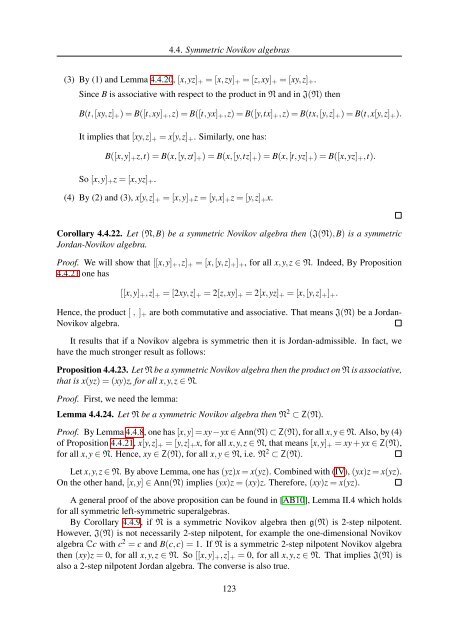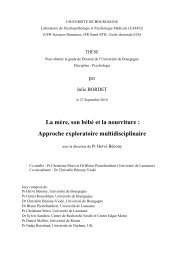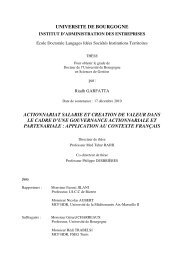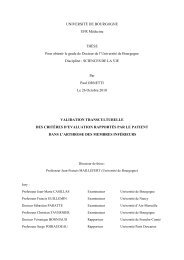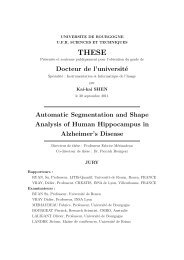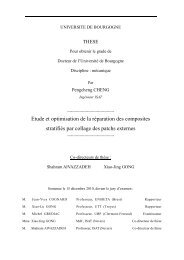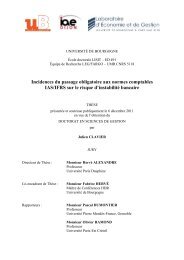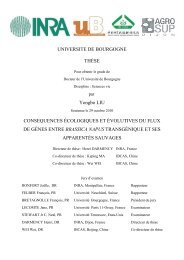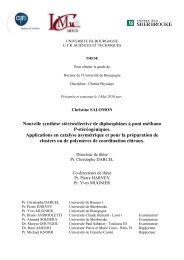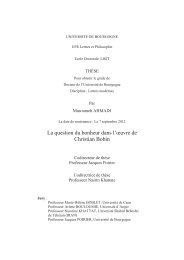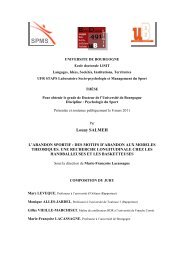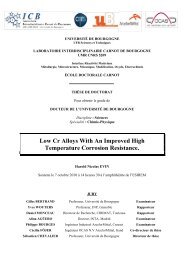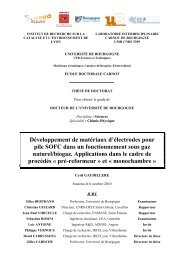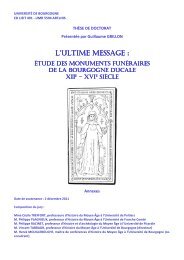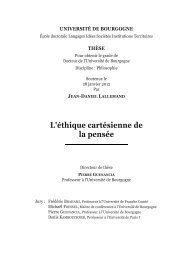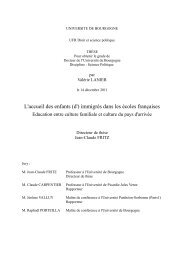TH`ESE A NEW INVARIANT OF QUADRATIC LIE ALGEBRAS AND ...
TH`ESE A NEW INVARIANT OF QUADRATIC LIE ALGEBRAS AND ...
TH`ESE A NEW INVARIANT OF QUADRATIC LIE ALGEBRAS AND ...
You also want an ePaper? Increase the reach of your titles
YUMPU automatically turns print PDFs into web optimized ePapers that Google loves.
4.4. Symmetric Novikov algebras<br />
(3) By (1) and Lemma 4.4.20, [x,yz]+ = [x,zy]+ = [z,xy]+ = [xy,z]+.<br />
Since B is associative with respect to the product in N and in J(N) then<br />
B(t,[xy,z]+) = B([t,xy]+,z) = B([t,yx]+,z) = B([y,tx]+,z) = B(tx,[y,z]+) = B(t,x[y,z]+).<br />
It implies that [xy,z]+ = x[y,z]+. Similarly, one has:<br />
B([x,y]+z,t) = B(x,[y,zt]+) = B(x,[y,tz]+) = B(x,[t,yz]+) = B([x,yz]+,t).<br />
So [x,y]+z = [x,yz]+.<br />
(4) By (2) and (3), x[y,z]+ = [x,y]+z = [y,x]+z = [y,z]+x.<br />
Corollary 4.4.22. Let (N,B) be a symmetric Novikov algebra then (J(N),B) is a symmetric<br />
Jordan-Novikov algebra.<br />
Proof. We will show that [[x,y]+,z]+ = [x,[y,z]+]+, for all x,y,z ∈ N. Indeed, By Proposition<br />
4.4.21 one has<br />
[[x,y]+,z]+ = [2xy,z]+ = 2[z,xy]+ = 2[x,yz]+ = [x,[y,z]+]+.<br />
Hence, the product [ , ]+ are both commutative and associative. That means J(N) be a Jordan-<br />
Novikov algebra.<br />
It results that if a Novikov algebra is symmetric then it is Jordan-admissible. In fact, we<br />
have the much stronger result as follows:<br />
Proposition 4.4.23. Let N be a symmetric Novikov algebra then the product on N is associative,<br />
that is x(yz) = (xy)z, for all x,y,z ∈ N.<br />
Proof. First, we need the lemma:<br />
Lemma 4.4.24. Let N be a symmetric Novikov algebra then N 2 ⊂ Z(N).<br />
Proof. By Lemma 4.4.8, one has [x,y] = xy−yx ∈ Ann(N) ⊂ Z(N), for all x,y ∈ N. Also, by (4)<br />
of Proposition 4.4.21, x[y,z]+ = [y,z]+x, for all x,y,z ∈ N, that means [x,y]+ = xy + yx ∈ Z(N),<br />
for all x,y ∈ N. Hence, xy ∈ Z(N), for all x,y ∈ N, i.e. N 2 ⊂ Z(N).<br />
Let x,y,z ∈ N. By above Lemma, one has (yz)x = x(yz). Combined with (IV), (yx)z = x(yz).<br />
On the other hand, [x,y] ∈ Ann(N) implies (yx)z = (xy)z. Therefore, (xy)z = x(yz).<br />
A general proof of the above proposition can be found in [AB10], Lemma II.4 which holds<br />
for all symmetric left-symmetric superalgebras.<br />
By Corollary 4.4.9, if N is a symmetric Novikov algebra then g(N) is 2-step nilpotent.<br />
However, J(N) is not necessarily 2-step nilpotent, for example the one-dimensional Novikov<br />
algebra Cc with c 2 = c and B(c,c) = 1. If N is a symmetric 2-step nilpotent Novikov algebra<br />
then (xy)z = 0, for all x,y,z ∈ N. So [[x,y]+,z]+ = 0, for all x,y,z ∈ N. That implies J(N) is<br />
also a 2-step nilpotent Jordan algebra. The converse is also true.<br />
123


